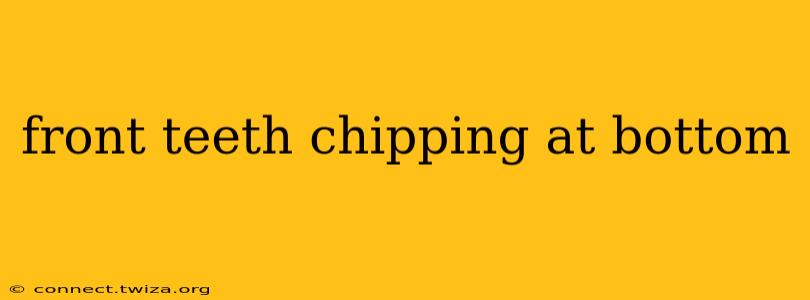Chipped bottom front teeth are a common dental concern, impacting both aesthetics and function. Understanding the causes, prevention strategies, and available treatments is crucial for maintaining a healthy and confident smile. This comprehensive guide explores everything you need to know about chipped bottom front teeth.
What Causes Chipped Bottom Front Teeth?
Several factors can contribute to chipping of the bottom front teeth. These range from accidental trauma to underlying dental health issues.
-
Trauma: This is the most frequent culprit. A fall, sports injury, or even a hard bite into something unexpectedly tough can easily chip a tooth. Children are particularly susceptible due to their active lifestyles.
-
Bruxism (Teeth Grinding): Habitual teeth grinding, often done unconsciously during sleep, puts significant stress on the teeth, leading to chipping and wear over time.
-
Worn Enamel: Enamel, the protective outer layer of your teeth, can wear down due to aging, acidic foods and drinks, and improper brushing techniques. This weakened enamel is more prone to chipping.
-
Dental Procedures: While rare, some dental procedures, such as fillings or crowns, can occasionally contribute to chipping if not performed correctly or if the restoration fails.
How Can I Prevent My Bottom Front Teeth From Chipping?
Prevention is always better than cure. Taking proactive steps can significantly reduce the risk of chipped teeth.
-
Wear a Mouthguard: If you participate in contact sports or are a known teeth grinder, wearing a custom-fitted mouthguard is essential. This protective barrier absorbs impact and prevents teeth from chipping or fracturing.
-
Practice Good Oral Hygiene: Regular brushing and flossing help maintain strong enamel. Avoid aggressive brushing, as this can wear down enamel over time.
-
Eat Carefully: Be mindful of what you eat. Avoid biting down on hard objects like ice, nuts, or hard candies. Cut hard foods into smaller, more manageable pieces.
-
Treat Bruxism: If you grind your teeth, consult your dentist. They may recommend a mouthguard, stress management techniques, or other treatments to alleviate bruxism.
-
Regular Dental Checkups: Regular checkups allow your dentist to identify and address any underlying dental issues early on, preventing further damage.
What are the Treatment Options for Chipped Bottom Front Teeth?
The best treatment option for a chipped bottom front tooth depends on the severity of the damage.
-
Dental Bonding: For minor chips, dental bonding is a quick and conservative solution. Your dentist applies a tooth-colored resin to the chipped area, shaping and polishing it to seamlessly blend with the rest of your tooth.
-
Dental Veneers: Veneers are thin, custom-made shells that cover the front surface of the tooth, improving both aesthetics and strength. They are a popular option for significant chips or discoloration.
-
Dental Crowns: For more extensive damage, a crown may be necessary. A crown covers the entire tooth, providing comprehensive protection and restoring its shape and function.
-
Root Canal Treatment: If the chip extends to the tooth's pulp (the inner part containing nerves and blood vessels), a root canal may be required to remove the infected tissue and prevent further complications.
Can a Chipped Bottom Front Tooth Heal on Its Own?
Unfortunately, no. A chipped tooth will not heal itself. Enamel is not a living tissue, so it cannot regenerate. The damage needs professional dental attention to prevent further complications like infection, sensitivity, or further chipping.
How Much Does Fixing a Chipped Bottom Front Tooth Cost?
The cost of repairing a chipped bottom front tooth varies greatly depending on the extent of the damage, the chosen treatment, and your location. Dental bonding is typically the most affordable option, while crowns are usually the most expensive. It's best to consult with your dentist for an accurate estimate based on your specific needs.
What Happens if I Ignore a Chipped Bottom Front Tooth?
Ignoring a chipped bottom front tooth can lead to several problems:
- Increased Sensitivity: Exposed dentin (the layer beneath enamel) can make your tooth highly sensitive to hot, cold, or sweet foods and drinks.
- Infection: Bacteria can enter the tooth through the chip, leading to an infection that can spread to the surrounding tissues.
- Further Damage: The chip can worsen over time, leading to more extensive damage that requires more complex and costly treatments.
- Aesthetic Concerns: A chipped tooth can negatively impact your smile's appearance and your confidence.
Addressing a chipped bottom front tooth promptly is crucial for maintaining oral health and preventing further complications. Schedule a consultation with your dentist to discuss treatment options and ensure a healthy, beautiful smile.
